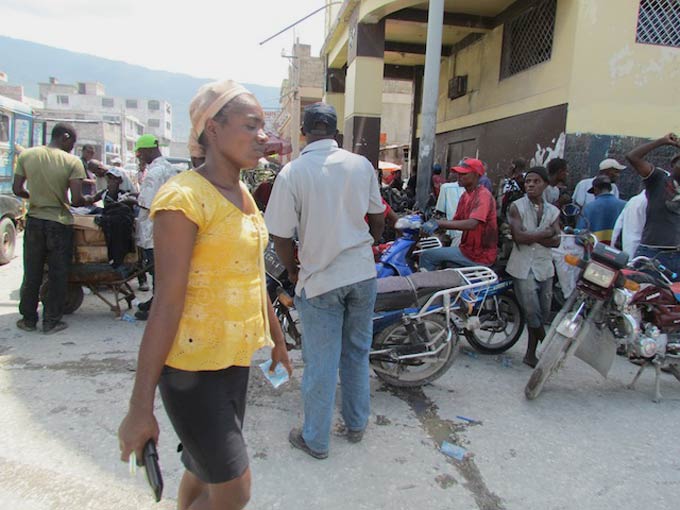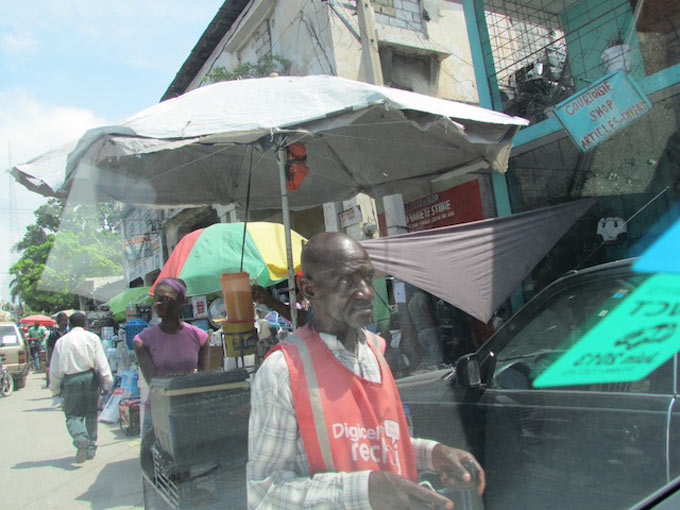
Jean-Euphèle Milcé, Port-au-Prince, 2012.
A Creative Time Reports and PEN American Center collaboration
Below is the essay in the original French. To jump to the English translation, click here.
—
Morts. Humanitaires. Affaires. Elections. Morts.
Ci-gît, la ville entière ou presque.
Il reste, malgré tout, la possibilité de bomber les murs de longs poèmes tels des chants de fronde à la veille d’un grand bouleversement.
Le temps a passé, lent et stupide. Les enfants comptent sur les doigts de la main gauche à partir de 2010. Julie avant douze ans et ses premières règles. Lucien utilisait son ballon à vessie pour oreiller. Son tout premier qui, bien utilisé, aurait pu l’emmener au mieux à Barcelone et au pire en soccer league à Los Angeles ou à New-York.
Ce qui a changé ? Pas grande chose ! Rien ! Comme avant en remontant jusqu’au douze janvier 2010, Les gens se comprennent, s’embrassent, partagent les grosses odeurs des corps à l’abandon sur des places publiques, jettent des vœux aux passants, dessinent les contours de l’avenir, montent des associations, organisent la fronde autour d’une seule réalité : la mort.
Depuis, et c’est tant mieux, la République a arrêté de pleurer. Puisque les plans de reconstruction, de tâtonnements, d’expérimentation de la bêtise ont proposé leur logique à la place des noms, des malheureux destins et des rêves totalement effondrés. Toutes les douleurs se valent et sont nivelées dans les abris provisoires, accessoirement dans les foutoirs de la relocalisation plus visible à la télé que sur le terrain. C’est une douleur bizarre qui cherche réponse dans l’affection –distribution- de l’aide humanitaire et dans le réconfort –surveillance- des promesses politiques.

Jean-Euphèle Milcé, Et…muets, 2012.
La ville est un lourd vacarme d’où ne sort aucune parole. Aucun assemblage grammaticalement compréhensible.
L’écriture, dans ce chaos, dans ce lieu déformé et plié cherche une prise qui soit sens à contresens de la terre, des esprits et des jours qui continuent de vaciller.
Là et autour, dans cet espace en ruine incapable d’étouffer l’odeur des corps en décomposition, il y avait une ville. Une ville tellement importante qu’elle symbolisait à la fois le protocole du pouvoir, la place de jeu des pauvres, le terrain de chasse des gangs, le marché de la misère. Ville de toutes les contrastes et de toutes les promiscuités, on y vivait, selon, à mille dollars ou à un dollar la journée. C’était peut-être la seule ville au monde où le pauvre pouvait habiter à coté du riche et le riche adorait faire des affaires à coté du pauvre.
Pour l’écrivain, pour le politique comme pour tout le reste, le séisme a effacé les repères, les certitudes et les tentatives de prendre racine. L’histoire ne peut plus être le récit des divers événements survenus au cours des siècles. L’histoire, c’est aussi hier et il y un instant. Tellement différent d’aujourd’hui et de maintenant.
Je prends à témoin le va-et-vient des secours, le cafouillage dans les déclarations, les visages des enfants deux bras ballant sur les trottoirs, désormais plus rien ne sera comme avant.
L’après, qu’il soit reconstruction ou anéantissement, ne pourra pas se soustraire à l’acharnement de la mémoire. Raconter. Raconter non pas comme une thérapie post-traumatique, mais pour gonfler les témoignages, leur donner l’allure de rumeurs qui partent à l’assaut de l’imaginaire collectif jusqu’à contaminer de peur les bébés nés pendant et après le séisme. Peur d’oublier. Peur de pardonner.
Trente deux mois d’attente. Je pronostique le double, le triple. L’infini. Parce que cent mille électeurs ne devaient pas être contrariés dans leur bidonville de béton obstruant le lit d’un ravin. Parce que le Bon Dieu est bon. Parce que les casques bleus nous protègent. Parce que le secteur de la construction informelle est le plus grand pourvoyeur civil d’emploi. Parce qu’on est trop pauvre pour avoir conscience du risque.
Autant de désespoirs et d’inquiétudes dans une ville, ça se voit. On le sent. Ça s’écrit dans un long poème sans âge dont les vers entourent la ville et voyagent jusqu’à New-York.
Tout va bien! Les enfants continueront de chanter la beauté du monde sur le chemin de l’école.
Nous, écrivains, continueront de composer de longs poèmes pour garnir les lieux de mémoire. Pour rappeler au monde notre malediction.
Pourtant la vie et la ville ne seront jamais comme avant. Jamais !
—
Dead people. Humanitarian workers. Business deals. Elections. Dead people.
Herein lies the entire city or most of it.
What remains, in spite of everything, is the possibility of spray-painting the walls with long poems like revolt songs on the eve of a big upheaval.
Time has gone by, slow and stupid. Children are counting from 2010 on the fingers of their left hands. Julie before she was twelve and her first period. Lucien used his air-bladder soccer ball as a pillow—his very first, which, if used properly, could have taken him to Barcelona at best or at worst to soccer league in Los Angeles or New York.
What’s changed? Not much! Nothing! Just as before, going back to January 12, 2012, people understand each other, kiss each other, share the big smells of bodies abandoned in public places, throw wishes to passersby, draw the outlines of the future, set up partnerships, organize the revolt around a single reality: death.
Since then, and that’s just as well, the Republic has stopped crying. Since the plans for reconstruction, for fumbling around, for experimentations in stupidity have offered their logic instead of names, wretched fates and dreams entirely collapsed. All griefs are of equal merit and leveled in temporary shelters, if need be in the dumps of relocation that are more visible on TV than on the ground. It’s a peculiar grief that seeks a response in the affection—the distribution—of humanitarian aid and in the comfort—the surveillance—of political promises.
And… mute.
The city is a heavy din from which no word escapes. No comprehensible grammatical assemblage whatsoever.
Writing, in this chaos, in this misshapen and folded place, looks for a hold that might make sense in the nonsense of the earth, of the minds and days that are continuing to falter.
Here and around here, in this space in ruins unable to stifle the smell of decomposing bodies, there was a city. A city so important that it symbolized at once the protocol of power, the poor’s play space, the gangs’ hunting ground, the market of destitution. City of every contrast and every promiscuity, you could live there for one thousand or for one dollar a day, depending. It may have been the only city in the world where the poor were able to live next to the rich and the rich loved to do business next to the poor.
For the writer, for the politician, just as for all the rest, the earthquake erased the points of reference, the certainties and the attempts at taking roots. History can no longer be the narrative of the various events that have occurred through the centuries. History is also yesterday and a moment ago. So different from today and from now.
I call to witness the to-ing and fro-ing in assistance, the bumbling in declarations, the faces of utterly idle children on the sidewalks, from now on nothing will ever be as before.
What comes after, whether it is reconstruction or annihilation, will not be able to escape the relentlessness of memory. To tell. To tell not as post-traumatic therapy but so as to swell the testimonies, to give them the appearance of rumors taking the collective imagination by storm until the babies born during and after the earthquake are contaminated with fear. Fear of forgetting. Fear of forgiving.
A 32-month wait. I forecast double that, three times that. Infinity. Because one hundred thousand people of voting age should not be frustrated inside their concrete shantytown blocking a ravine bed. Because the Good Lord is good. Because the blue helmets are protecting us. Because the field of construction in the informal economy is the largest civilian purveyor of employment. Because we are too poor to be aware of risk.
So many despairs and worries in a city is a visible thing. It is felt. It is written in a long ageless poem whose verses surround the city and travel up to New York.
Everything’s fine! Children will keep on singing about the beauty of the world on their way to school.
We, writers, will keep on composing long poems to fill the places of memory. To remind the world of our curse.
Yet life and the city will never be as before again. Never!
Translated by Christine Schwartz Hartley
Special thanks to Deji Olukotun, Freedom to Write Fellow at the PEN American Center, for making this “Dispatch” possible.

